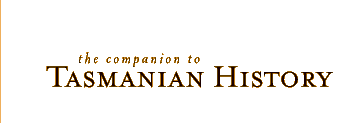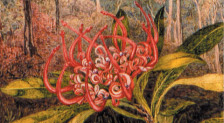 |
 |
|
History History was taught in Tasmania as soon as schools were established: British history, learned by rote. When public examinations were established in 1860, History was a major subject, with factual questions ('Name the chief plots in Charles II's reign'). From the 1890s the new University of Tasmania ran the public examinations, and in 1904 included Tasmanian History into the Junior Public, and Australian History into the Senior Public (matriculation). Since then various branches of History have been widely taught, by differing methods. When the University of Tasmania's classes began in 1893, William Jethro Brown, a Cambridge graduate in Law and History, lectured in these subjects. Classics was also a foundation subject. Brown left and after a number of short-term appointments, in 1906 RL Dunbabin, a Tasmanian who had studied at Oxford, was appointed lecturer in Classics and History, and taught British and Ancient History. Economic History has also been part of Economics. History was separated from Classics in 1919 with the appointment of Charles King as History lecturer (professor, 1935–56) and topics included European history. Dynamic new blood arrived after the Second World War: George Wilson (1947), Malcolm MacRae (1950) and WA Townsley (1951). In 1947 Wilson introduced Pacific and Asian history, pioneering courses for Australian universities. Europeanist John McManners, professor 1956–1960, kept up spirits in troubled times and is arguably the best most outstanding historian to have lived in Tasmania. Expansion in the 1960s saw five undergraduate courses, in European (two), Pacific, Asian, and Australian history. New appointments included Australianists Michael Roe (1960, later professor) and Kay Daniels (1967–84), a pioneer of Australian women's history; Richard Davis (Irish and Tasmanian history, 1967; later professor) and Europeanist Professor Barrie Rose (French Revolution, 1968), while in 1956 Townsley founded the Political Science department and pioneered the study of Tasmanian politics. The 1970s saw further expansion, newcomers including medievalists Rod Thomson (1975, later professor) and Michael Bennett (1977, later professor), but numbers were falling, especially after the introduction of Sociology in 1975. History, though strong in research, was in decline until approximately 1990. Meanwhile, in Classics, Dunbabin (professor 1917–39) was followed by Professor John Elliott (1941–66), who in 1944 introduced a new topic and Australian first, Ancient Civilisations; Paul Weaver (1967–1992); and Peter Davis (1975, later Associate Professor). Change occurred in the 1990s. The university's amalgamation with the Tasmanian State Institute of Technology led to the absorption in 1997 of the latter's history programme into a cross-campus School of History; and that year History and Classics amalgamated, which has proved beneficial to both. Curriculum reform, particularly in first year, was the basis for growth, which made possible strong new appointments, which in turn enabled further growth. The University of Tasmania now provides a variety of courses in Hobart, Launceston and Burnie, and to the entire state through distance education, while there is a substantial research component. Many Tasmanian historians, including as well as the above-named, Dr Asim Roy, have published work of international stature, and history has been taught in other disciplines. In Economics, in the 1960s Ken Dallas ignited debate on the reasons for Australia's settlement. Philosopher and psychologist E Morris Miller's Australian literature (1956) is a major text. Geography has produced interesting work, notably RJ Solomon on urbanisation, and various sociologists have dealt with historical themes. The University is the centre of academic research into Tasmanian history, though ex-student Lloyd Robson, of the University of Melbourne, published the major A history of Tasmania (1983, 1991). The Centre for Tasmanian Historical Studies (1984–) encourages research into Tasmanian history, publishing books, holding conferences and seminars, and engaging with the wider community, and the School has published three further volumes of Historical Records of Australia (1997, 2003, 2006). In recent years, research fellowships have been awarded to professors Henry Reynolds and Cassandra Pybus. Graduates to have made their mark include historians Marilyn Lake and Henry Reynolds, author Richard Flanagan, activist Rodney Croome, diplomat Stephen Fitzgerald, and many politicians including Christine Milne and a number of Tasmanian premiers. Further reading: R Davis, Open to talent, Hobart, 1990. Alison Alexander |
Copyright 2006, Centre for Tasmanian Historical Studies |